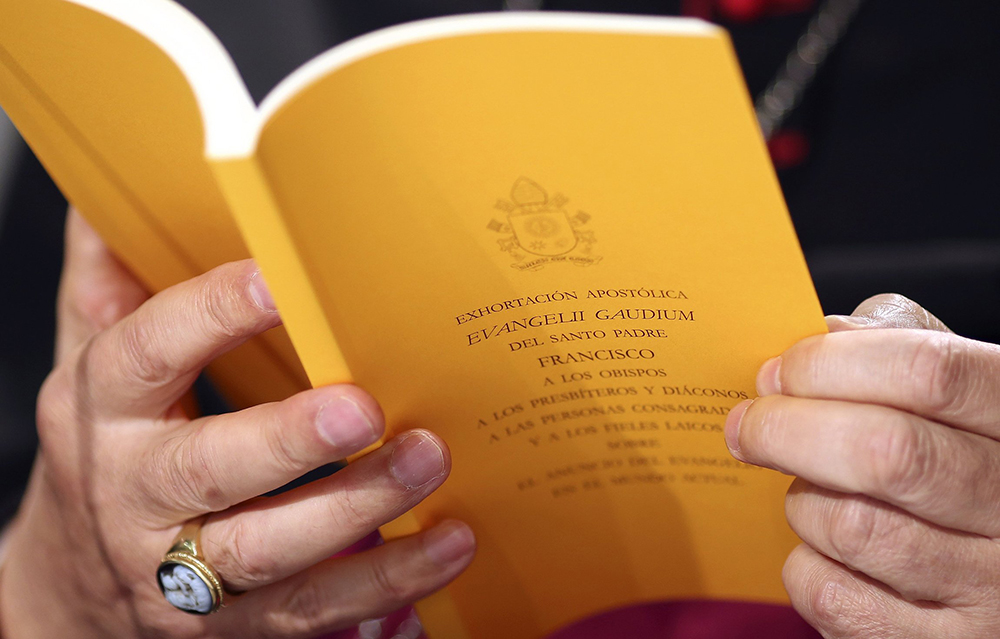
WASHINGTON — Ten years ago, Pope Francis issued his first extensive piece of writing as pope with the apostolic exhortation, “Evangelii Gaudium” (“The Joy of the Gospel”), a document that laid out his vision for how the Catholic Church should evangelize the modern world.
The 224-page text, issued Nov. 24, 2013, was hailed at the time by Church experts as a must-read for anyone interested in knowing what the pope saw as the future path for the Church. It was described as both a map and guide for the church’s way forward.
Those who read the document today will recognize many of the themes that he has continued to emphasize over the past 10 years, such as reaching out to the poor, the need for peace, the role of the laity and Church leaders, respect for creation, and the importance of social justice and interreligious dialogue.
“Evangelii Gaudium” emphasized the Church’s important missionary role not as just another program but instead as something stemming from a personal encounter with Christ, a theme he has frequently revisited in his pontificate.
In the text, issued just eight months after he became pope, one phrase in particular caught a lot of attention — that Church leaders to truly be shepherds must take on the “smell of the sheep” by listening and being close with those they serve.
The document’s opening paragraph urged Catholics to “embark on a new chapter of evangelism” and continued by saying that Catholics should see themselves as “permanently in a state of mission.”
Throughout the text, the pope used a frank style that became part of his trademark.
Regarding the role of Catholics to be missionaries, he essentially said it is not a part-time job.
“My mission of being in the heart of the people is not just a part of my life or a badge I can take off; it is not an ‘extra’ or just another moment in life. Instead, it is something I cannot uproot from my being without destroying my very self,” he wrote.
He also said, “An evangelizer must never look like someone who has just come back from a funeral!”
The text also brings home the message about the Church’s responsibility to the poor. It says: “Jesus wants us to touch human misery, to touch the suffering flesh of others. He hopes that we will stop looking for those personal or communal niches which shelter us from the maelstrom of human misfortune and instead enter into the reality of other people’s lives and know the power of tenderness.”
Coincidently, the document also has something to say about synodality, which is fitting for the current moment as the Catholic Church is in the middle of the Synod on Synodality and just wrapped up nearly a month of synod discussions at the Vatican.
Massimo Faggioli, professor of theology and religious studies at Villanova University, just outside Philadelphia, said that in “Evangelii Gaudium,” Pope Francis was “clearly in favor of allowing theological and doctrinal conversations which were not thinkable before” and stressed that “differing currents of thought in philosophy, theology, and pastoral practice can enable the Church to grow, since all of them help to express more clearly the immense riches of God’s word.”
Faggioli told The Tablet that the pope’s 10-year-old document also points out that not everyone supports the synodal aspect of the Church.
The text says: “For those who long for a monolithic body of doctrine guarded by all and leaving no room for nuance, this might appear as undesirable and leading to confusion. But in fact, such variety serves to bring out and develop different facets of the inexhaustible riches of the Gospel.”
Faggioli also pointed out that an interesting aspect of the pope’s first apostolic exhortation was that it was issued following the synod of 2012 under Pope Benedict XVI on “The New Evangelization for the Transmission of the Christian Faith.”
The church theologian said this document delivered a clear indication of Pope Francis’ idea of the Church by saying he prefers “a Church which is bruised, hurting, and dirty because it has been out on the streets, rather than a Church which is unhealthy from being confined and from clinging to its own security.”
Lyn Pace, chaplain at Oxford College of Emory University in Atlanta, said the document highlights “the way the Church shows up in the world.”
He said it’s telling that the pope begins by talking about joy, adding that for the past 10 years he has “continued to infuse the role and message of the papacy, and thus the Church, with a joy that resists apathy” and also encourages those who take up the Church’s mission of spreading the Gospel message to do so based on their own faith experience.
In an email, he said that as a chaplain who works with diverse religious and spiritual practices on campus, he is very much aware of “how this document laid out a vision for how the Catholic community engages with the broader social communities” in working for peace, in relationship to science and with interreligious dialogue.
He also said that looking at these words now, a decade later, “seems poignant given the most recent emergence of conflict in the Middle East.”
